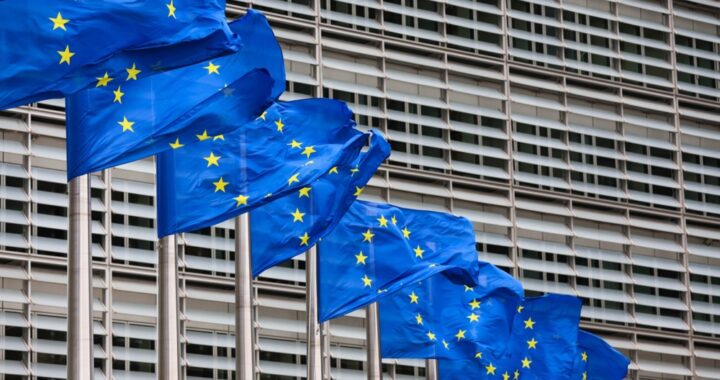

 European flags in front of European Commission headquarters Berlaymont building in Brussels, Belgium, 11 April 2023. EPA-EFE/OLIVIER HOSLET
European flags in front of European Commission headquarters Berlaymont building in Brussels, Belgium, 11 April 2023. EPA-EFE/OLIVIER HOSLET
Dialogue with Serbia remains the insurmountable challenge for Kosovo, the yearly progress report by the EU Commission stated.
Since the war in Ukraine, the process of European Union enlargement has gained new momentum and has moved away from the stagnant state of the past 15 years.
For the first time, the report included Ukraine, Georgia, and Moldova, and recommended Ukraine and Moldova to open the negotiation process for becoming EU members.
The report acknowledged Vetëvendosje Government’s push for the EU agenda, and praised the electoral reform. However, it criticised the lack of cooperation between political parties as well as disagreements within the majority.
The Commission urged Kosovo to make more compromises and demonstrate a more serious commitment in normalising relations with Serbia. It also emphasised the need for both Kosovo and Serbia to fully implement all past dialogue agreements. The report highlighted that the normalisation of relations is an essential condition on the European path, and the lack of progress could result in missed opportunities for both parties.
The report restated that Serbia should cooperate in shedding light on the Banjska attack of September 24.
It expressed that boycotting local elections by the Kosovo Serbs does not offer a long-term political solution for these municipalities. It emphasised the importance of restoring the situation to a point where Kosovo Serbs actively participate in local governance.
“Early local elections need to be held as soon as possible in all four municipalities, organised in a fully inclusive manner, and with the unconditional participation of Kosovo Serbs,” the report stated.
The report stated that Kosovo needs to make more efforts to de-escalate the situation in order for the EU-imposed measures of June to be revoked.
Administrative reform of the country has made limited progress, the judicial system is considered to be at an early stage of development, and limited progress has been made in the fight against corruption.
“While last year the Assembly adopted significant anti-corruption legislation and the legal framework on criminal confiscation is advanced, a lot remains to be done to implement the anti-corruption legislation. […] Kosovo should step up efforts to have more proactive investigations, final court decisions and final confiscation of assets,” the report noted.
Limited progress was made on the investigation and prosecution of organised crime cases, according to the Commission, and fighting organised crime in the north of Kosovo and combating money laundering continues to be challenging.
Some progress was made in developing a functioning market economy, according to the Commission.
“[…]the private sector continues to be hindered by long-standing structural challenges such as a widespread informal economy, a high prevalence of corruption and the overall weak rule of law. High revenue growth due to rising prices and increasing numbers of people in formal work, and a significant under-execution of public capital spending led to an almost balanced budget in 2022,” the report added.
In digital transformation and media, progress was limited. Progress was noted in the energy sector, but limited progress was made in the climate change fight.
Progress reports are published by the European Commission on a yearly basis to measure the progress of countries that aim to join the European Union.
09 November 2023 - 17:32

A significant portion of the information consumed by the citizens of K...

Former intelligence agency chief Driton Gashi was sentenced to four ye...

Kosovo has emerged as a critical transit point along the Balkan route,...

Prishtina court upholds initial 2024 sentence of 13 years' imprisonmen...